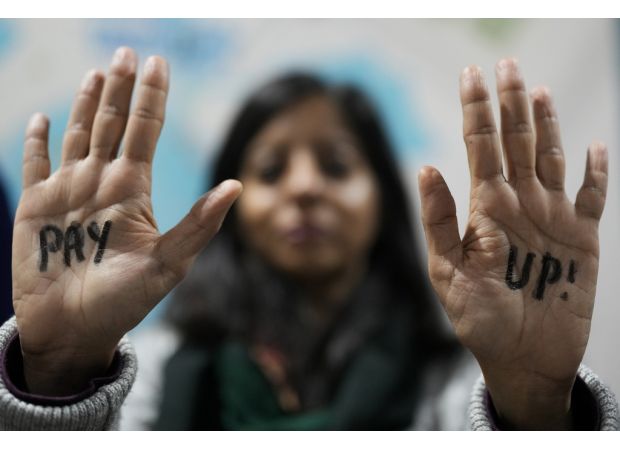Global leaders agree on $460bn climate deal after close call at summit
Rich nations accused of betraying Global South with small amount of aid.

After weeks of tense negotiations and political turmoil, the world has finally reached a new climate agreement at COP29 in Baku, Azerbaijan. The deal, which was announced on Sunday, involves wealthy nations pledging to provide $US300 billion annually by 2035 to help poorer countries cope with the devastating impacts of the climate crisis. However, many developing nations have criticized this amount as grossly inadequate.
The talks were marked by bitter divisions and chaos, with boycotts, political spats, and even open celebrations of fossil fuels. At one point, there was a fear that the discussions would completely fall apart, as representatives from vulnerable small island states and least-developed countries walked out on Saturday. But after more than 30 hours past the deadline, nearly 200 countries finally came to an agreement.
Mukhtar Babayev, the president of COP29 and a veteran of the Azerbaijani state-oil company, declared that the doubters were proven wrong. The $US300 billion will be allocated to help vulnerable nations cope with extreme weather events and transition to cleaner energy sources. Simon Stiell, the head of the United Nations Framework Convention on Climate Change, described the journey to this deal as difficult, but ultimately successful. He emphasized that this new finance goal is like an insurance policy for humanity, as the impacts of climate change continue to affect every country.
However, the amount pledged falls far short of what economists say is needed to truly help developing countries face the climate crisis, which they have contributed the least to. This has sparked fury among many developing nations, with India's representative Chandni Raina slamming the $US300 billion as a mere "paltry sum". She called the agreement an "optical illusion" that cannot address the enormity of the challenge they all face. Others, like Tina Stege, the Marshall Islands climate envoy, also harshly criticized the outcome and slammed the talks as a display of political opportunism.
The focus of COP29 was heavily on finance, which is a crucial issue but also a politically contentious one. In 2009, rich countries agreed to provide $US100 billion a year by 2020 to developing nations. However, this promise was only fulfilled in 2022, two years past the deadline. At Baku, the task was to come up with a new number. The deal reached on Saturday requires wealthy nations, including the US and European countries, to provide $US300 billion annually by 2035, a combination of public and private finance. While there is also an ambition to scale up to $US1.3 trillion, developing nations wanted the richer countries to shoulder a larger share of this and for the money to be mostly in the form of grants rather than loans, which would further burden them with debt. However, the G77 group of developing nations' call for $US500 billion was rejected as unrealistic by richer countries.
Avinash Persaud, the special advisor on climate change to the President of the Inter-American Development Bank, acknowledged the difficulty in finding a balance between what is politically achievable and what would make a real difference for developing nations. There was also a push for emerging economies like China and Saudi Arabia to contribute to the financing, but the agreement only encourages voluntary contributions and places no obligation on them. Li Shuo, the director of the China Climate Hub at the Asia Society Policy Institute, called the deal a flawed compromise that reflects the challenging geopolitical landscape of the world.
The summit was held at the end of a year that is set to be the hottest on record and has been riddled with deadly extreme weather events like hurricanes, floods, typhoons, and droughts. The urgency of addressing climate change has never been more apparent, but this was always going to be a difficult COP. The host country, Azerbaijan, is a petrostate, and the talks were heavily influenced by fossil fuel interests. In fact, over 1700 lobbyists or industry players were present, outnumbering most country delegations. The election of Donald Trump in the US also cast a shadow over the proceedings, as he has expressed skepticism about the climate crisis and vowed to pull out of the Paris climate agreement.
Saudi Arabia, the world's top oil exporter, was even more emboldened in rejecting ambitious action at this COP, publicly and explicitly rejecting any reference to oil, coal, and gas in the deal. Climate scientist Friederike Otto described it as another "shady, oil-stained COP", while also noting the low public interest and high level of cynicism surrounding the talks. Many climate groups have heavily criticized the summit and its outcome, with Tasneem Essop, the executive director of Climate Action Network, calling it the most horrendous climate negotiations in years. Harjeet Singh of the Fossil Fuel Treaty Initiative added that the outcome offers false hope and urged continued efforts to demand more significant financing and hold developed countries accountable.
1 Views






